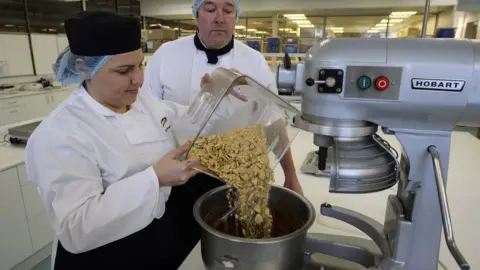McVitie's closure: Scots bakers lose jobs with heritage
 McVitie's
McVitie's- McVitie's biscuit brands each day accompany many millions of cups of tea, growing out of an Edinburgh shop 190 years ago to have the biggest share of Britain's £3bn biscuit barrel.
- Corporate control has passed out of Scotland, and its Turkish owner now says it has to protect brands that go back 130 years by closing a historic Glasgow factory and investing in England.
- Biscuit bakers have had a good lockdown, but face the challenge of sweet foods being more regulated.
Digestives, Rich Tea, Club, Penguin, Jaffa Cake, Hobnobs and 14 other brands make McVitie's a valued part of daily life for many millions.
Market research tells us that biscuits are in the shopping baskets, at some point, of 99.5% of British households.
So this would be a good time to pause and think about the people who get them there.
News about the closure of McVitie's only remaining Scottish bakery will be indigestible to nearly 500 workers and their families in a part of east Glasgow that has long needed jobs like that.
Investment in production lines is going elsewhere - the firm has a portfolio of five other UK factories - Carlisle, Leicestershire, Sheffield, Manchester and Harlesden, employing 4200 people.
Pladis, the parent company - based in Middlesex, owned in Turkey - says the consultation on closure will be "full and meaningful", but trade unions complain there's very little information so far on the business case for closure.
Consultation is a legal requirement where jobs are recognised as being put "at risk". Usually, that means the decision is already made, it can't be changed, and the jobs are not "at risk", but going for sure.
Gobbling bakers
If that is the end of the bakery in Tollcross, nearly 100 years after the Victoria Biscuit Works opened as flagship of the MacFarlane Lang family business, it will be the end of a once strong Scottish presence that came to dominate the Great British tea break.
McVitie's grew out of a bakery in Rose Street, Edinburgh, first opened in 1830. The Digestive was a breakthrough innovation in 1892 that is still at the core of the business.
 Getty Images
Getty ImagesThe company, by then McVitie & Price, opened a vast London factory in 1902, where it still produces. The Digestive first got a chocolate covering in 1925, and the Jaffa Cake went on sale two years later.
Wartime rationing reduced 370 lines of the company's biscuits to only 10, and McVitie's was well-placed to gobble up those that had been less resilient.
The Penguin biscuit was developed by a rival Glasgow baker from 1932, and later became part of McVitie's. In 1948, it merged with Glasgow's big MacFarlane Lang to become United Biscuits.
Some 52 years ago, as other plants closed, including one in Edinburgh, the Glasgow bakery benefited from a whopping £2.3m investment for expansion. At its peak, it employed more than 1,300 workers.
Rich Tea for royalty
From the 19th Century onward, McVitie's was the go-to baker of royal wedding cakes, including that of the current Queen, in 1947.
The Duke and Duchess of Cambridge, married 10 years ago, opted for a cake that comprised 1,700 Rich Tea biscuits and a lot of chocolate.
 WPA Pool/Getty Images
WPA Pool/Getty ImagesUnited Biscuits became a big corporate player through the connections of its Scots chairman, Sir Hector Laing.
He was the grandson of the Digestive biscuit's inventor and a prominent Conservative and friend of Margaret Thatcher. He made UB one of the party's biggest corporate backers and was Tory treasurer for five years.
But in 2000, 10 years after he stood down, it was taken over by a private equity investor. Five years ago, it became part of a new company, Pladis, created by a Turkish family-run investment firm, Yildiz Holdings, and named after a constellation.
Pladis also owns Godiva chocolate, Carr's water biscuits, Go ahead! BN, Verkade and Ulker (the Yildiz family's name). Its most recent published accounts show revenue above £2bn in 2019, with an operating profit of £154m. Its share of the UK biscuit market edged up to 23%.
The company website claims it has 16,000 workers in 25 factories, located in 11 countries, including Kazakhstan, Saudi Arabia, Egypt and Nigeria, plus a chocolate research centre in Belgium. There's nowhere without a sweet tooth.
Trends and tastes
So the Glasgow plant is a small, apparently dispensable cog in a multi-national machine.
As Scotland has found repeatedly, ownership elsewhere means there's little attachment to the company's roots in Scotland, and sentimentality about biscuits does not cut it with shareholders.
 Google
GoogleThe company understands brand sentiment though. Pladis UK's boss, David Murray, told staff that the products are much loved, and the Glasgow bakery is a defensive move for their future.
"In order to protect them for generations to come, we must take steps to address excess capacity in the UK," he said. "This overcapacity limits our ability to make the right investments in future capabilities to meet the very big changes in our industry."
Asked what the big changes are, they told me - macro-economic headwinds (which usually indicates an economy-wide downturn), plus the need "to meet current and future consumer trends and tastes".
However, the main problem is UK over-capacity, I'm told, and Glasgow lost out because of its "utilisation, volume and product mix".
'Hot drink moments'
Some more context can be found in the 'annual biscuit review' from Pladis, which reflected on a bumper 2020 for comfort snacking. Britain's biscuit market grew 7% last year, or £212m, reaching nearly £3bn.
It seems people eased off on the healthier biscuits segment of the market, sold as a packaged breakfast for commuters. While working at home, we opted for something reassuringly familiar to dunk in our tea and coffee. Sales of Digestives were up 26%, and Club biscuits by 17%.
In marketing jargon, Pladis' vice-president of consumer reported: "Last year we saw more people re-acquainting themselves with the category, and buying in more frequently to complement an uplift in hot drink moments at home."
Consumer behaviour is shifting fast, and marketers have had to adapt to a doubling of online grocery shopping in the past year. That brings opportunities and challenges ahead.
In that irresistible jargon, Pladis' annual biscuit review suggests that it should "disrupt shoppers' online journeys with creative executions, and drive interest in the category via NPD (new product development)".
Pladis prides itself on getting new products to market in around six months - a third of the industry standard.
It goes on: "With working from home expected to continue for many, the hot drink moment is here to stay".
And it adds: "Premium biscuit options will remain relevant for shoppers wanting to treat themselves. These often benefit from a 'lipstick effect' as shoppers look to these products as small, permissible indulgences."
Shopping as 'theatre'
Citing survey figures suggesting that 65% of biscuits are eaten with a hot drink, marketers at Pladis want to "develop new biscuit rituals and synergies beyond the traditional pairing of tea and biscuits".
They noted in the 2019 review that 37% of consumers will snack instead of having a proper meal at least once a week.
There's an expectation that Christmas 2021 is going to be a bumper sales opportunity.
But beyond that lies a big threat, as governments squeeze HFSS content (high fat, sugar or salt) with regulation of advertising, marketing and perhaps price.
The returned SNP government had action on that in its election manifesto. And despite the prime minister's well documented aversion to "nanny state" intervention, Whitehall is looking at it too.
One of the suggested answers, from pladis' marketing gurus is to "bring fixtures to life through in-aisle theatre and engagement".
I can only guess what that means. It's a long way from the job concerns now at the Glasgow bakery. But who knew that selling a biscuit could be made to sound that exciting?
